Mar 12
Bill and Dave Enter the D’Agata Storm
categories: Cocktail Hour
16 comments
For a reasonable (non-hysterical) take on the D’Agata controversy, check out Dinty Moore on Brevity’s Nonfiction Blog.
And this one from Ned Stuckey-French…..

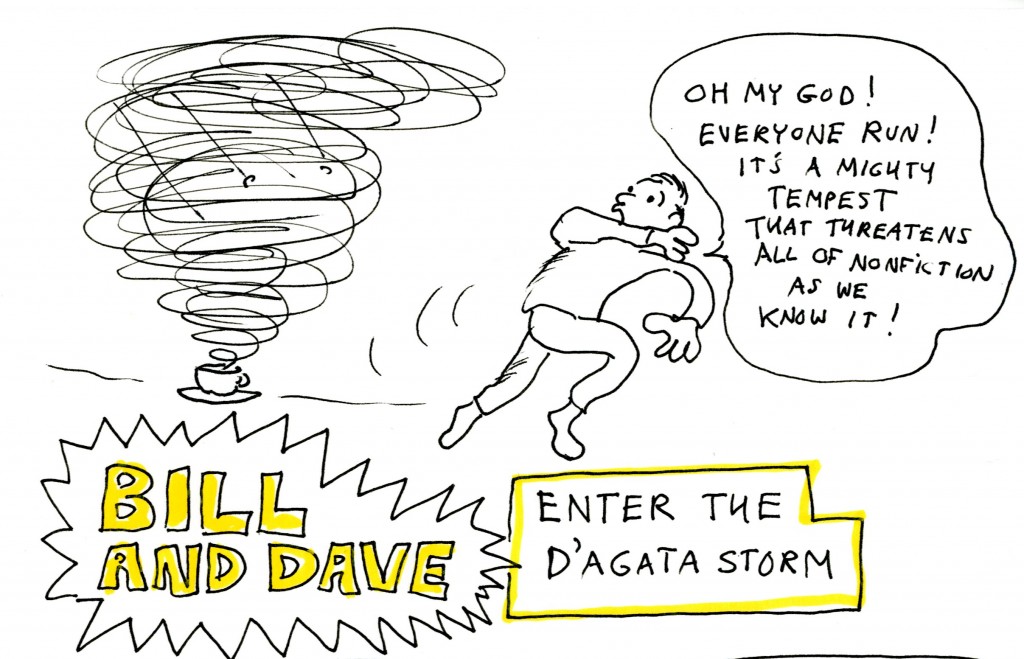
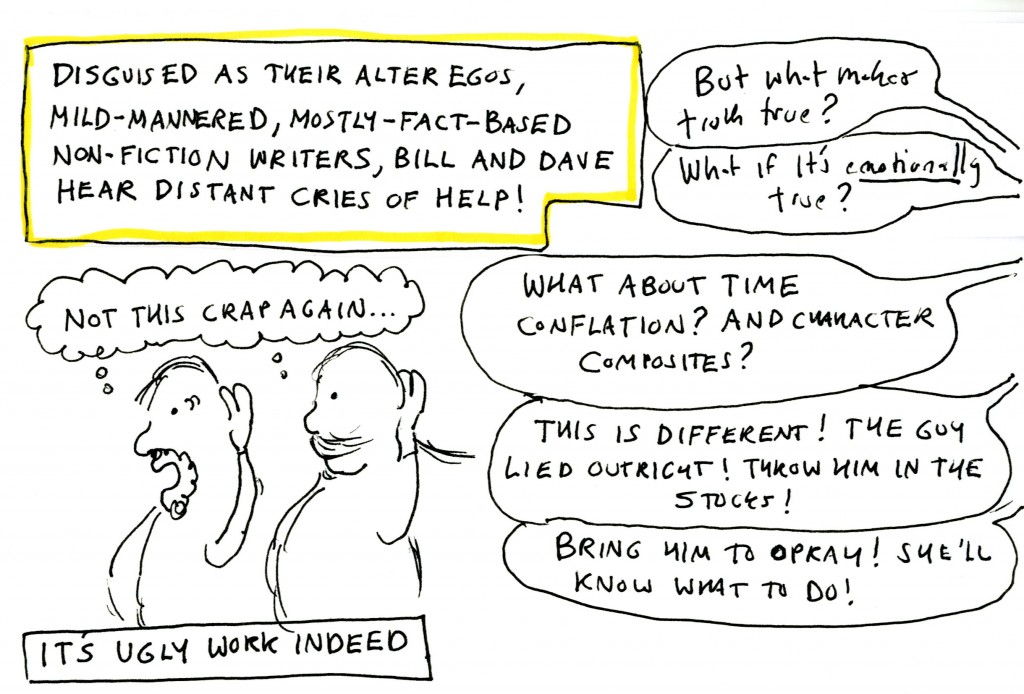
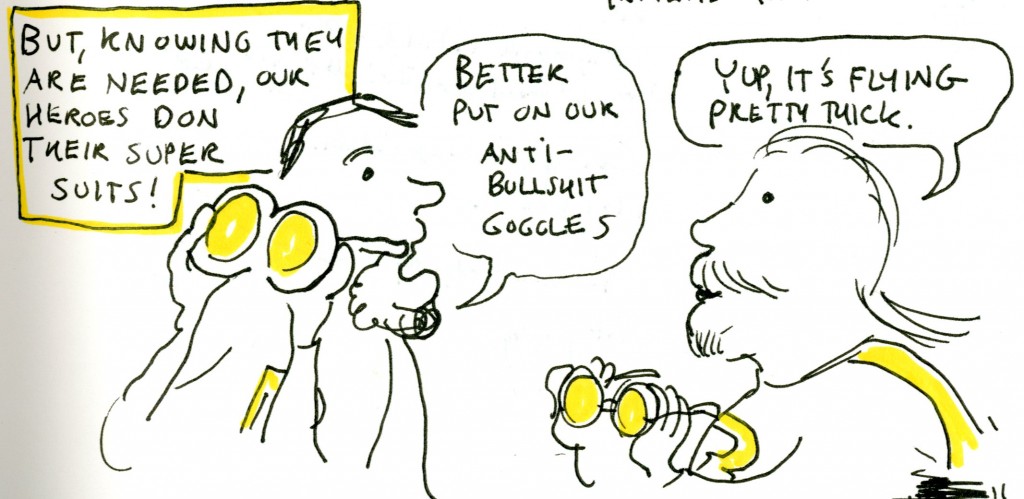
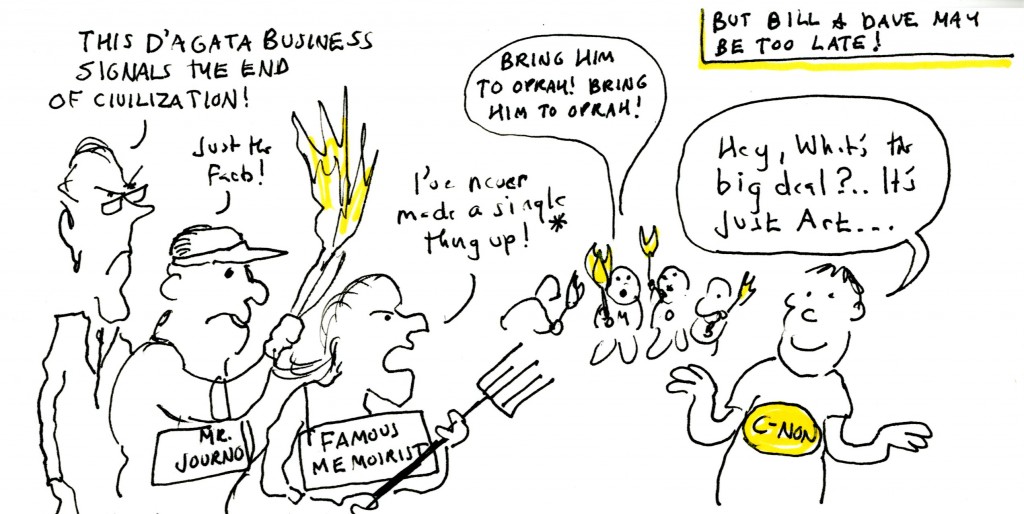
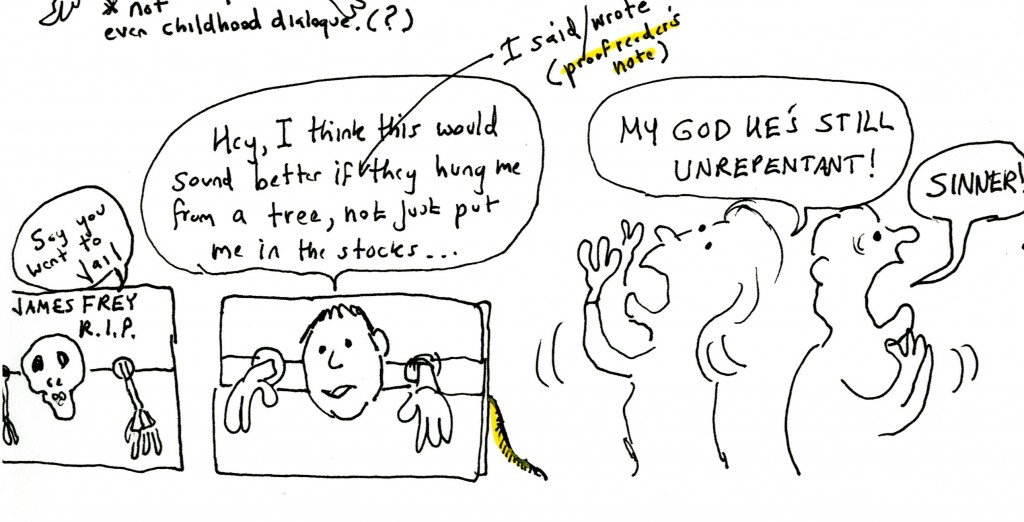
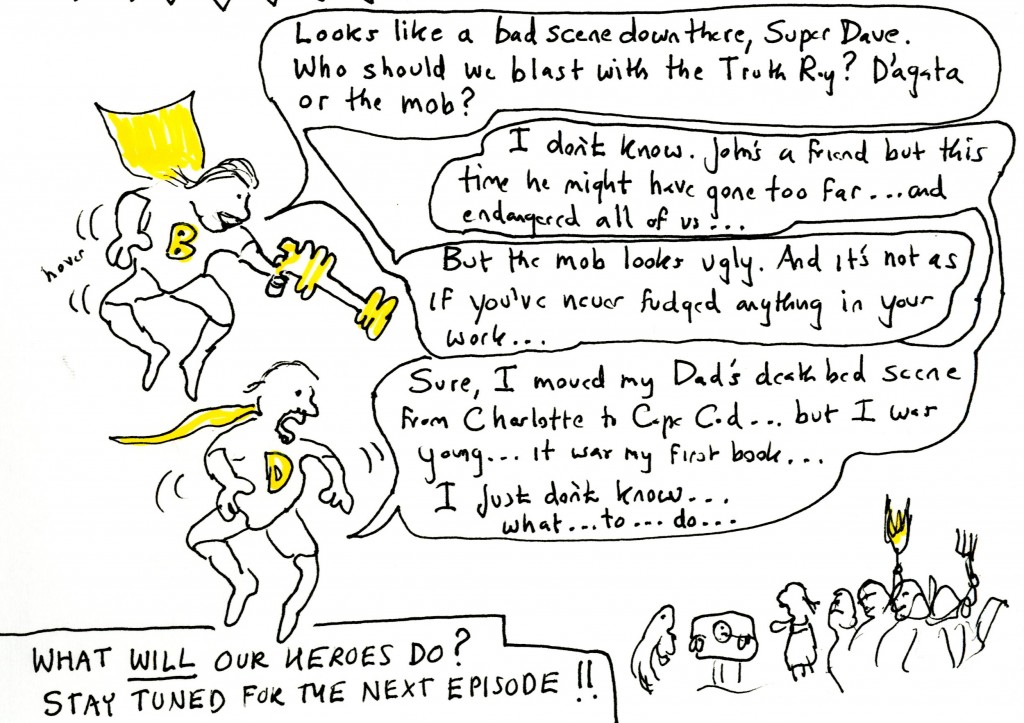

I haven’t read the work in question, so I really don’t have much to say. But my sense is that Mr. D’Agata is a performance artist, working in collaboration with a performance factchecker, and they must be pleased to have stirred up so much emotion in such a large audience, wow! Other artists who use lies as their medium do more damage: Janet Miller (of the New York Times), who helped get the U.S. into war with Iraq, for example. That was quite a performance, and in collaboration with all that president’s men, and funded by Mobil/Exxon. And while we’re at it, the entire Republican debate show. Wow again. When those guys dance, people die! Meanwhile, there’s nonfiction, and there’s whatever Mr. D’Agata is up to, two different games. Dave, what does that ray gun of ours do, anyway? I’m inclined to aim it at the mob.
Agreed, what Miller did was sordid. She was a dupe, at best, and furthered a blinkered administration’s criminal and tragic war. What she did shows better than anything the underbelly of traditional journalism and the great need for books like About a Mountain.
The Lifespan of a Fact, from the excerpt I have read, is obviously a performance and funny in its way. It got everyone stirred up because it reveals so many more intentional fact errors in About a Mountain that are not flagged in the endnotes of that book.
D’Agata has said art tricks us into seeing things in new ways. So artist as trickster. I believe what you taught me, Bill. That the reader is a friend. So how long do you call someone a friend who views you, apparently, as a joke? i don’t feel like I have been told a joke, shared a joke, or understood the joke.
The only possible sense I can make of what he did to intentionally flaw About a Mountain was that it’s a joke about literature itself or authors and the way they use themselves as Important sensors and emotional stand-ins (I do think that that role is important, actually) and how they use facts as if the exact number of strip clubs in Vegas matters. Not really, but how does changing the number for “rhythm” do anything?
Could be this all relates to an idea he has about the nature of knowledge. If so, it is too abstracted for me and appears to mock his own efforts, however uncool tradition and sincerity may be to him. I don’t know, because he didn’t treat me like a friend or ally in this aspect of his inquiry, if that’s even what it was.
Well, you know, an artist can put Christ in a vial of piss and I get it. Doesn’t mean I like it or that I’m going to go see it. But I’m not going to be one of the priests freaking out, either. It is helpful to envision the reader as engaged and interested and sympathetic while you draft. But I take my writers one at a time. There are plenty of despicable and even dangerous people who tell the truth. Mr. D’Agata’s more of a tap dancer, seems to me. And the fact-checker is his partner. I hear it’s a good act, love it or hate it, and love it or hate it, it will have its run.
Who are the “despicable and dangerous people who tell the truth”? I’m really curious.
Well, like those journalists that report what the officials they follow around say–it’s demonstrably true the officials said it–but don’t go behind the scenes to find out what’s not being said, or whether what’s said is true, and don’t go look for what matters. Or those people so sure in their beliefs that they can say I hate gays, say, or I hate Jews. That’s true, they do. And they write about it convincingly (okay, perhaps this is where the lies come in), and then so the next person believes and can say that true thing: I hate x too. Or, like, “Dead men tell no tales.” That’s true. And you say it just before you put the silencer on. But really I was talking about journalists.
Editor’s Note: And with this Bill leaves the country. (Seriously.)
Bill,
“Piss Christ” was great, though not comparable really to what D’Agata did. I humbly think D’Agata should be compared with long-form narrative journalists or nonfiction book writers, or even personal essayists, not newspaper reporters. Though I admit I made that comparison, too–I was one, and it tends to set my default on standards of factual accuracy, for better or worse. As to the larger inaccuracies or lies of newspaper journalists, well, yes. Their practices sure open up great fodder for magazine and book writers, though. it is one reason I think the existential burden is greater in long form and book work, because it can’t be dodged like it can in newspapers, though any reporter worth a damn is trying real hard. There are bad ones and ones who can’t surmount the conventions of the objective style.
Maybe the most sensible mass-circulation essay on this flap, and I think I have read them all, is in The New York Times Magazine by Gideon Lewis-Kraus, “The Fact-Checker Versus the Fabulist,” url:
http://www.nytimes.com/2012/02/26/magazine/the-fact-checker-versus-the-fabulist.html?pagewanted=all
Well, I write and teach a lot of memoir writing. And for myself, I’m not interested in making anything up. I’m interested in the struggle with “what really happened.” That is put in quotes not because I think that’s an artificial category but because “what really happened” is sometimes not so easy to face. Or even to remember. But it’s a necessary foil in writing memoir. Because memoir is really “about” our subjectivity, our confusion, say, what mystifies us or what whacks us around. So when I am reconstructing a scene with my mother, for example, and I can’t remember the look on her face or even what she said, I think it’s more interesting at that point to write about that dilemma. “I remember she was wearing the awful polyester red-flowered dress but I can’t see now whether she twisted her mouth in disapproval or not. I think not. I want to think not.” In memoir, we toggle in and out of various “realities,” including once naive beliefs and hard, terrible lessons. I trust when a writer of memoir has that impulse to face into all these competing “realities,” including our exaggerated, defensive presentations of ourselves. I didn’t like Frey’s writing because I thought he didn’t have the courage to face what was really going on for him in recovery. Adopting the persona of the tough guy, he never figured out how traumatized he had been all his life.
I’m reading an AMAZING nonfiction narrative, The Devil’s Highway, by Luis Alberto Urrea, about the death of a bunch of Mexicans trying to sneak into American from the Arizona desert. It is deeply, palpably researched and yet very obviously and fully imagined real incident.
The writer earns my trust and my pleasure in his imagination as he creates scenes and riffs on what it must be like to be at the mercy of smugglers and to die of thirst and heat in the desert. i am also awed by his journalistic immersion and investigation and insight, all conveyed with a light touch. And now I also know what the Border Patrol thinks and how it sees the world, too.
So, yeah, nonfiction can be imaginative. Of course it can and is.
But in light of this book, or any of Tracy Kidder’s or McPhee’s work, but this one really strikes me as I read it during the flap, what D’Agata did seems both puerile and decadent. As well as totally unnecessary and weird. He wrote a beautiful book and in the endnotes planted little bombs for those dull enough or dogged enough to check out his methods. Now, in The Lifespan of a Fact, he rubs everyone’s in the stink, giving new examples of absurdities not mentioned in the previous book’s endnotes. No wonder everyone is going ape.
I give Urrea however much fiction he wants to stir into The Devil’s Highway. I trust him. D’Agata’s changes were done to make some kind of point I just don’t get, especially since they were pointless (perhaps his point?) But the book presents itself as a rather journalistic, in the best sense, nonfiction inquiry. It isn’t nearly as overtly imaginative as The Devil’s Highway, but is brilliant in conception and execution by its own lights. For some reason, that wasn’t enough for him.
And even if we “artists” get it, or some do, civilians will never understand, whereas a book like The Devil’s Highway teaches itself and justifies itself to anyone who reads it.
I hope you don’t mind but I sent your note along to Luis, who was very appreciative.
Well, guys, at the risk of getting my ass kicked by you two adorable gents, whom I love:
I DO see something wrong with saying that five events happened on the same day if they IN FACT did not. Why does this opinion turn people into screaming-meemies? The nonfiction writer’s art is not finding “emotional truth’ or some such crap, but rather to take life AS IT IS and find the emotional-and-ever-other-ind-of-truth in THAT. The former is easy; the latter is damn freakin’ HARD. And if it turns out there’s not enough art in the thing you chose to write about, then write it as fiction and fib to your heart’s content.
I’m so sick of this. Nobody believes anything anymore, and fifty people have already asked me if my upcoming memoir is “true.” Thanks a bunch, Frey et al.
Monica,
I’m with you (almost) all the way. My main target here was the renewed hysteria. Is truth true? etc…Thanks to this it’s all we’ll talk about in workshop the rest of the year.
And, as I pointed out to Bill on the phone, I actually didn’t move my Dad’s deathbed scene….. Just thought that would be funny to say and appropriate to the genre (cartoon).
Dave
P.S. My own nonfiction has evolved to the point where I think you’d be hard pressed to say that any of the facts are wrong. Though I’m sure I’ve screwed up a couple of times.
My point is that there’s a big difference between misremembering, screwing up facts, and being a BIG FAT LIAR.
And I wouldn’t mind if you moved your father’s deathbed to Dubai, as long as you let me, the reader, in on the ruse.
I’ve always had the problem of people suspecting my fiction is real (I know that’s really you) and my nonfiction not (I know you made that up). But I think Dave’s post begs the question: is Dave’s cartooning true?
Monica,
I’m with you. I guess we’re not as creepy smart as D’Agata and just don’t get how brilliant he is. The ego in his emails to the fact-checker would be enough to embarrass anybody…but he seems proud. It’s actually kind of chilling that the guy is teaching young writers.
If he wants to make stuff up, he should just write short stories and novels. Otherwise he’s not some brilliant artist, he’s just a mean, bullying liar.
And here’s one from Paul Haney, who is a grad student of Ned Stuckey-French’s at Florida State, also from Brevity.